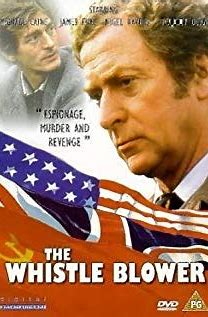Simon Langton’s The Whistle Blower plays
rather flatly for a film that involves several state-orchestrated murders and cites pending apocalypse as a key part of its motivation, but still provides
adequate diversion and stimulation overall. Michael Caine plays Frank, father of Bob
(Nigel Havers), a Russian expert toiling away for British intelligence, toying
with quitting but then finding something that renews his interest, that is
before he’s found dead in what may or may not be a suicide. The film is a
periodically interesting time capsule, bookended by a London Remembrance Day
ceremony providing glimpses of Margaret Thatcher and other dignitaries; there
are several references to hard economic times, with Frank counseling his son on
the folly of quitting a steady job, and to Britain’s utter dependence on the
United States, given that (as one high ranking functionary puts it) a nuclear
war with Russia is assessed to be a pending near-certainty. There’s not much
razzle-dazzle to how things unwind though: Frank gets the name of one key contact through
the mildest outburst of aggression, then in turn extracts the necessary
information from that contact simply by filling him up with booze, and reaches
his ultimate object (John Gielgud) by turning up on the doorstep and being
welcomed in. Caine gives one of those performances where you’re not sure how
hard he cares or is trying (I mean that as a compliment); the rest of the cast
mostly only briefly registers, although Barry Foster gives the drunk scene his
all. But for a film in which a journalist and other innocent individuals are cold-bloodedly
eliminated for the sake of political calculation (and the perpetrators calmly
express their willingness to throw in a young woman and her child, if that's what it takes for Frank to yield), while
guilty but well-connected men are shielded from consequences, the narrative and
moral sophistication fall short of what should have been required.


No comments:
Post a Comment